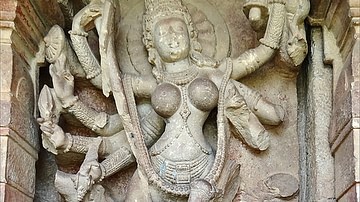Search
Search Results

Definition
Hades
Hades was both the name of the ancient Greek god of the underworld (Roman name: Pluto) and the name of the shadowy place below the earth which was considered the final destination for the souls of the dead. Perhaps the most feared of the...

Definition
Cyclops (Creature)
A cyclops (meaning 'circle-eyed') is a one-eyed giant first appearing in the mythology of ancient Greece. The Greeks believed that there was an entire race of cyclopes who lived in a faraway land without law and order. Homer, in his Iliad...

Definition
Ancient Egyptian Art
The artworks of ancient Egypt have fascinated people for thousands of years. The early Greek and later Roman artists were influenced by Egyptian techniques and their art would inspire those of other cultures up to the present day. Many artists...

Definition
Germ Theory
The germ theory, which emerged in the late 19th century, demonstrated that microscopic germs caused most human infectious diseases. The germs involved included bacteria, viruses, fungi, protozoa, and prions. Louis Pasteur (1822-1895), a French...

Definition
Cerberus
Cerberus (also spelt Kerberos) is a vicious three-headed dog in Greek mythology, who guards the entrance to the underworld. He allowed the souls of the dead to enter Hades but prevented the living (except for a few exceptions) from entering...

Definition
Devi
Devi, also known as Mahadevi or 'Great Goddess', is an all-embracing Mother Goddess first worshipped in India in Prehistoric times. In the Vedic period, she was assimilated into the Hindu pantheon and so came to represent the female energy...

Definition
Empedocles
Empedocles (l. c. 484-424 BCE) was a Greek philosopher and mystic whose work harmonized the philosophies of Parmenides (l. c. 485 BCE), Heraclitus (l. c. 500 BCE), and Pythagoras (l. c. 571 to c. 497 BCE) in presenting a unified vision of...

Definition
Richard III of England
Richard III of England ruled as king from 1483 to 1485 CE. Richard succeeded Edward V of England (r. Apr-Jun 1483 CE), the son of Edward IV of England (r. 1461-1470 CE & 1471-1483 CE) in mysterious circumstances. The young Edward V and his...

Definition
The Tragedy of Richard III - Shakespeare's First Great Villain
The Tragedy of Richard III, often referred to as simply Richard III, is a history play by William Shakespeare (1564-1616), probably written around 1592-94. It is the fourth and final installment of the 'first tetralogy' of Shakespeare's history...

Definition
Hanuman
Hanuman is one of several zoomorphic characters in Indian mythology, but is the only wholly animal figure who is revered as a god today. The mythic texts speak of him as a monkey child of the Wind God, as possessing enormous strength, keen...